初三九年级新目标英语第七单元(1)[思维导图知识点知识树复习资料]
人教版新目标英语九年级Unit7全单元 ppt课件

watch TV
listen to music
make my room a mess
人教版新目标英语九年级Unit7全 单元
Do your parents allow you to choose your own clothes? No, they don’t.
AD
2. Sixteen-year-olds should be allowed to
drive.
AD
3. Students should not be allowed to have
part-time jobs. A D
4. Sixteen-year-olds should be allowed to
1. Anna can go to the shopping center by
bus. T F
2. Anna wants to get her ears pierced.
TF
3. Anna wants to choose her own clothes.
TF
人教版新目标英语九年级Unit7全
单元
1c Look at the statements in la and make conversations.
人教版新目标英语九年级Unit7全 单元
人教版新目标英语九年级Unit7全 单元
Do your parents allow you to watch TV? Yes, they do.
You are allowed to watch TV.
allow sb. to do sth. be allowed to do sth.
A: I don’t think sixteen-year-olds should be allowed to drive.
人教版初中英语九年级全册语法知识点思维导图

`how引导的特殊疑问句by+doing sthThe+比较级,the+比较级It's+形容词+for sb to do sth Sb find it+形容词+to do sth 固定搭配的用法finish doing sth/t 「y to do sthwhat引导的感叹旬What+ (a/an)+ad」+名词(+主话+谓语+其他)lHow+ad」/adv+主语+谔语+其他l情态动词wou ld 、could 的用法Could you please tell me how to get to the post office ?Section A How I Learned to Learn EnglishSection B How Can You Become a Successful Learner?Section A Full Moon,Full FeelingsSection B The Spirit of ChristmasSection A Fun T imePark-Always a Fun TimeUnit1 How can we become good learners7Unit2 I think thatmooncakes are delicious!Unit3 Could you please tell me where the restrooms are?Could you please tell me where the 「estau「ants a「e?used to do 的用法I used to be af 「aid of the dark. 形容词最离级的用;the+序数词+最窝级+N 第几One of the/形容词性物主代词+N s 谓语用三单N o matter+whaVwhen/where 二whatever/whenever/whereverSection B Could You please (7)Section A From Shy Girl to Pop Sta「Section B He Studies Harder Than He Used T oSection A The Dificult Search for American Products in the USb e made from和be made of 的用法和区别般现在时的被动语态am/is/are+过去分词Section B Beauty 1n Common Thingssometi m e 一段时间sometimes有时some times几次sometime某个时候等饲语辨析be used by sb. 被某人使用—股过去时的被动语态was/we飞+过去分词常用的系动词有look,feel,be,become,get,turn,smell,taste,stay(保待),keep 等词的用法Section A AnAccidental InventionSection B Do You Know When BasketballWas Invented?r section A Mom Konws BestUnit4 I used to be afraid of the darkUnit5 What are the shirts made of?Unit6 When was it invented?Unit? Teenagers should be allowed to choose their own clothesalso 、创her 、too 的用法She is a sixteen-year-old girl 二She is sixteen yea 「s oldSection B Should I Be Allowed to Make My Own Decisions? IUnit8 It must belong to Carla.Section A Read the article and decide which might be the best titlesomething,anything,nothing, everything等不定代词There must be something visiting our home must, m ay, m ight, c ou l d,may,can't S ecti o n B Stonehenge---Can Anyone Exp固n Why It Is There?The d心onary must be mineSection A What Do You Feel Like Watching Today?Unit9 I like music that I can dance toSection A Read the following opinionsUnit10 You're supposed to shake hands.Unit11 Sad moviesmake me erUnit12 Life is full of the unexpected.Unit13 We'「e tr ying to save the earth!Section A The Shirt of a Happy Man,ection B The Winnin a函m Section A Life Is Full of the UnexpectedSection B Read the passageSection A Save the Sharks!Section A I RememberUnit14 I remember meeting all of vou in Grade7Section B Readthe passageI like music that I can dance toWe are supposed to stoo smokin g .it 是形式主语或形式宾语I was supposed toarrive at7:00make sb do/make sb adjSoft and quiet music makes me relax.I 过去完成时的逻用By the time I got outside,the bus had already leftI was about to go up to my of f ice when I decided to get a cof f ee firstHe used not to stay up late.清态动词的被动语态情态动词+be +动词的过去分词a d ifferent些基本句型的I凡固和使用I remember being avolunteer.。
新目标英语九年级第七单元单元知识讲解1-4
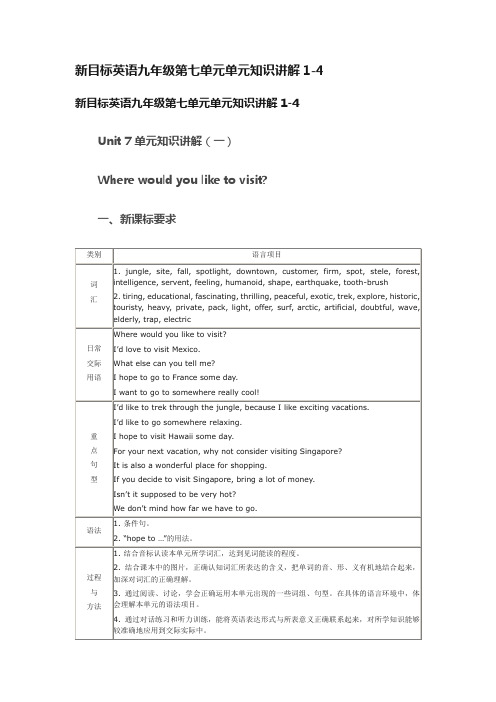
新目标英语九年级第七单元单元知识讲解1-4 新目标英语九年级第七单元单元知识讲解1-4 Unit 7单元知识讲解(一)Where would you like to visit?一、新课标要求二、新知识点全解1. Where would you like to go on vacation, Sam? Sam, 你想到哪儿去度假?(1)句中的would like表示“想要”,是一种较委婉礼貌的说法,常用于以下几种句式:<1>would like+名词(或代词),意为“想要”。
例如:I’d like a new computer.我想要一台新计算机。
(其中I’d是I would的缩写)He’d like some hamburger and juice.他想要汉堡包和果汁。
(其中He’d是He would的缩写)<2>would like +to do,意为“想做……”。
例如:She’d like to go there alone.她想单独去那里。
We’d like to see our teacher in hospital this Sunday.这个星期天,我们想去看看住院的老师。
<3>would like +名词(或代词)+to do,表示“希望……做……”。
例如:I’d like you to meet my friends.我希望你见见我的朋友们。
I’d like them to stay for dinner with us.我希望他们留下来和我们共进晚餐。
<4>would like+名词(或代词)+形容词,意为“喜欢……呈……状”。
例如:I’d like the windows open at night.晚上(睡觉)我喜欢开着窗户。
I’d like this trouble settled at once.我希望这件麻烦事能马上得以解决。
人教版九年级英语各单元主题思维导图(1-10)

Learning how to learn
单元整体话题篇
Structures
A: Do you learn English by reading aloud? B: Yes, I do. It helps with my pronunciation A: How can I improve my pronunciation? B: Well, one way is by listening to tapes.
阅读篇-Section B 2b
The Spirit of Christmas
Sharing and giving love and joy
The Best Example: A Christmas Carol (a novel by Charles Dickens)
three ghosts 1. the Ghost of... Past 2. the Ghost of... Present 3. the Ghost of... Yet to Come
Keep practicing what they have learnt
Be not afraid of making mistakes By writing down key words or by drawing mind maps
By reading notes every day or by explaining the information to another student
by working with friends /a group by writing e-mails to pen pals take notes by writing down key words or by drawing mind maps Maybe you should join an English club. Don't read word for word. Read word groups. Be patient. It takes time. Practice makes perfect.
新目标英语九年级Unit 7 SectionA 知识总结

Unit 7 Teenagers should be allowedto choose their own clothes.Section A教学目标:1语言目标:理解并正确运用本单元的重点词汇2 技能目标:熟练运用“should (not) be allowed to do”谈论应该被允许和不应该被允许做某事;熟练运用“be (not) allowed to do”谈论被允许和不被允许做某事;熟练运用“I agree / disagree.”或“ I don’t agree.”表达自己的观点。
3 情感目标:通过了解和反思自己的言行举止是否符合中学生日常行为准则、规范自己的言行,养成自觉遵守规则的良好习惯和优良品德;正确看待“家规”“班规”“校规”等,并能认真遵守;明白父母、教师的合理建议对自己成长的重要性4文化意识目标:了解中外审美观的差异,形成自己的审美观,展示个性;了解中西方关于青少年的不同文明准则。
教学重点:1.重点语法:被动语态2. 重点词汇:smoke, pierce, license, safety, earring, cry, field, hug, lift, awful, teen, regret, poem, bedroom , community, chance, manage, society, unit, educate, professional, enter, supporttalk about, keep away from, make one’s own decision, get in the way of3. 重点句型:I don’t think sixteen-year-olds should be allowed to drive.I agree./ I disagree. I think sixteen is too young.Do you think teenagers should be allowed to work at night?Yes, I do. / No, I don’t.4. 教学难点:含情态动词should的被动语态结构“should be allowed to”5. 知识点:1. 宾语从句在think, believe, suppose, expect等动词之后,且主句主语为第一人称(I , we),变否定时,要“否定前移”;变反义疑问句时,附加问句要与从句一致。
人教版新目标九年级全册英语 Unit 7 单元语法知识点考点复习提纲
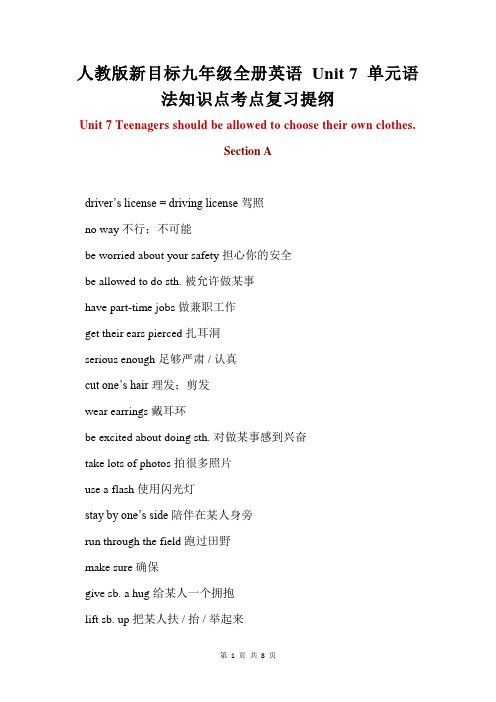
人教版新目标九年级全册英语Unit 7 单元语法知识点考点复习提纲Unit 7 Teenagers should be allowed to choose their own clothes.Section Adriver’s license = driving license驾照no way 不行;不可能be worried about your safety 担心你的安全be allowed to do sth. 被允许做某事have part-time jobs 做兼职工作get their ears pierced 扎耳洞serious enough 足够严肃 / 认真cut one’s hair理发;剪发wear earrings 戴耳环be excited about doing sth. 对做某事感到兴奋take lots of photos 拍很多照片use a flash 使用闪光灯stay by one’s side陪伴在某人身旁run through the field 跑过田野make sure 确保give sb. a hug 给某人一个拥抱lift sb. up 把某人扶 / 抬 / 举起来talk back (to sb.) (和某人)回嘴 / 顶嘴watch scary movies 看恐怖电影be back by ten 10点以前回来think back to those times 回想那些时光have scary dreams 做噩梦regret doing sth. 后悔做过某事do social work for their community 为他们的社区做社会福利工作keep ... away from ... 避免……接近……;使……远离……give sb. a chance to do sth. 给某人一个机会做某事make one’s own decision(s)自己做决定move out 搬出去be educated to do sth. 被教育做某事from a young age 从小manage their own lives 成功应对他们自己的生活Section Bpass / take the test 通过 / 参加考试be strict with sb. 对某人严格get in the way of ... 挡……的路;妨碍……a professional runner 职业跑步运动员grow up 成长;长大;成熟achieve his dreams 实现他的梦想support every one of his races 支持他的每一次比赛have nothing against sth. 不反对某事think about other possible jobs 考虑其他可能的工作end up as ... 最终成为……decide for myself 我自己做决定make this choice myself 我自己做这个选择enter university 上大学be serious about ... 严肃 / 认真对待……spend more time on his homework 在他的家庭作业上多花点时间care about 关心;在意have a chance to do sth. 有机会做某事【重点句型】1. I don’t think twelve-year-olds should be allowed to get their ears pierced. 我认为不应该允许12岁的孩子穿耳孔。
人教版九年级英语各单元主题思维导图(1-10)

It‘s important to learn how to use the right language in different situations. This will help you communicate better with other people.
Getting around
初中英语人教版九年级全一册
Unit3 Could you please tell me where the restrooms are?
单元主题思维导图
阅读篇-Section B 2b
How to ask for help politely
In different situations, choose and use suitable language based on.
阅读篇-Section B 2b
The Spirit of Cng love and joy
The Best Example: A Christmas Carol (a novel by Charles Dickens)
three ghosts 1. the Ghost of... Past 2. the Ghost of... Present 3. the Ghost of... Yet to Come
...
初中英语人教版九年级全一册
Unit2 I think that mooncakes are delicious!
单元主题思维导图
Jacob Marley
In the past, 1. mean 2. not treat others nicely 3. just care about making more money, hate Christmas
人教版新目标九年级英语Unit 7讲义及重点总结

新目标九年级Unit 7 Teenagers should be allowed to choose their own clothes. 讲义一、词性转换Section A1. safety→ (adj.) safe2. part-time → (反义词.) full-time3. badly → (adj.) bad4. educate → (n.) education5. manage → (n.) management Section B6. enter → (n.) entrance7. choice → (v.) choose二、短语归纳1. be worried about 为…担心2. have part-time jobs做兼职工作3. get one’s ears pierced打耳洞4. be excited about对…感到兴奋5. take lots of photos拍许多照片6. by my side在我身边7. through the field穿过田间8. make sure确信9. keep…from…使…避开…10. give sb. a hug给某人一个拥抱11. talk back顶嘴12. listen to sb.听某人说13. agree with sb.赞同某人14. learn…from…向…学习…15. keep…away from…使…避免接近…;使…远离…16. make one’s own decisions 自己做决定17. manage one’s own life应付自己的生活18. be strict with sb. 对某人要求严格19. get in the way of挡…的路;妨碍20. achieve one’s dreams实现某人的梦想21. how much多么22. end up结束23. be serious about认真对待…24. care about关心25. make this choice做出这个选择26. in the end最后27. keep off关闭三、句型集萃1. be allowed to do sth. 被允许做某事2. stop doing sth. 停止做某事3. get sth. done使某事被做4. should do sth. 应该做某事5. what to do做什么6. need to do sth. 需要做某事7. spend time with sb. 与某人共度时光8. be excited about doing sth.对做某事感到兴奋9. hurt oneself伤到自己10. give sth. to sb.把某物给某人11. regret doing sth. 懊悔做某事12. allow sb. to do sth. 允许某人做某事13. practice ding sth. 练习做某事14. take care of oneself照顾自己15. start doing sth. 开始做某事16. continue to do sth. 继续做某事17. see sb. do sth. 看见某人做过某事18. love doing sth. 喜欢做某事19. have nothing against doing sth.不反对做某事20. have a chance to do sth. 有机会做某事21. spend more time on sth.在某事上花费更多时间一、重点句子1. I don’t think sixteen-year-olds should be allowed to drive. 我认为不应该允许16虽的青少年开车。
九年级英语unit7知识点归纳总结
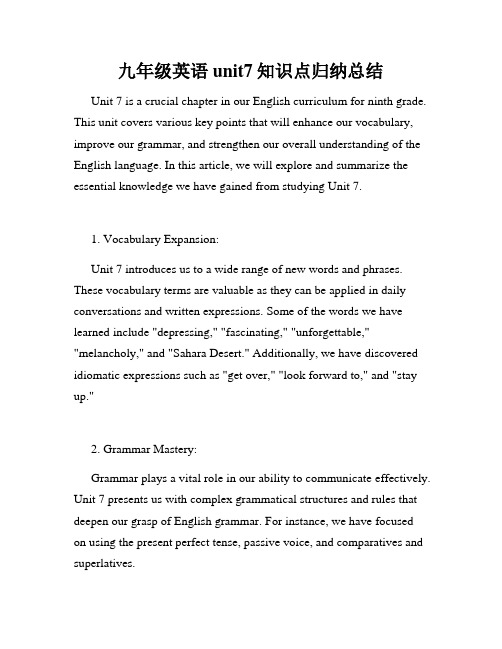
九年级英语unit7知识点归纳总结Unit 7 is a crucial chapter in our English curriculum for ninth grade. This unit covers various key points that will enhance our vocabulary, improve our grammar, and strengthen our overall understanding of the English language. In this article, we will explore and summarize the essential knowledge we have gained from studying Unit 7.1. Vocabulary Expansion:Unit 7 introduces us to a wide range of new words and phrases. These vocabulary terms are valuable as they can be applied in daily conversations and written expressions. Some of the words we have learned include "depressing," "fascinating," "unforgettable," "melancholy," and "Sahara Desert." Additionally, we have discovered idiomatic expressions such as "get over," "look forward to," and "stay up."2. Grammar Mastery:Grammar plays a vital role in our ability to communicate effectively. Unit 7 presents us with complex grammatical structures and rules that deepen our grasp of English grammar. For instance, we have focused on using the present perfect tense, passive voice, and comparatives and superlatives.The present perfect tense allows us to discuss past experiences while emphasizing their relevance to the present. The passive voice enables us to shift the focus from the subject to the object in a sentence, thus altering the sentence structure. Comparatives and superlatives help us compare and contrast different objects or actions based on their degree.3. Reading Comprehension:Unit 7 involves reading various texts that range from personal narratives to informational passages. By practicing reading comprehension, we enhance our ability to understand and analyze written texts. This skill is crucial as it helps us extract information, identify the main idea, and comprehend the writer's intent.4. Speaking and Listening:In Unit 7, we have engaged in several speaking and listening activities. These activities allow us to practice our verbal communication skills and enhance our listening comprehension. By listening attentively and participating actively in conversations, we can improve our pronunciation, expand our vocabulary, and become proficient in expressing our thoughts fluently.5. Writing Skills:Unit 7 emphasizes both creative and formal writing. Through creative writing exercises, we have honed our skills in constructing narratives, developing characters, and creating engaging plotlines. On the other hand, formal writing tasks have helped us structure our ideas in a logical manner, improve our grammar and vocabulary usage, and adopt a professional writing style.In conclusion, Unit 7 has been a comprehensive and valuable chapter in our English learning journey. The acquisition of new vocabulary, the mastery of grammar rules, the improvement in reading comprehension, the development of speaking and listening skills, and the enhancement of writing abilities are all crucial components we have gained from this unit. As we move forward, we should continue to revisit and reinforce these knowledge points, ensuring their integration into our long-term English language proficiency.。
九年级英语unit7知识点归纳总结
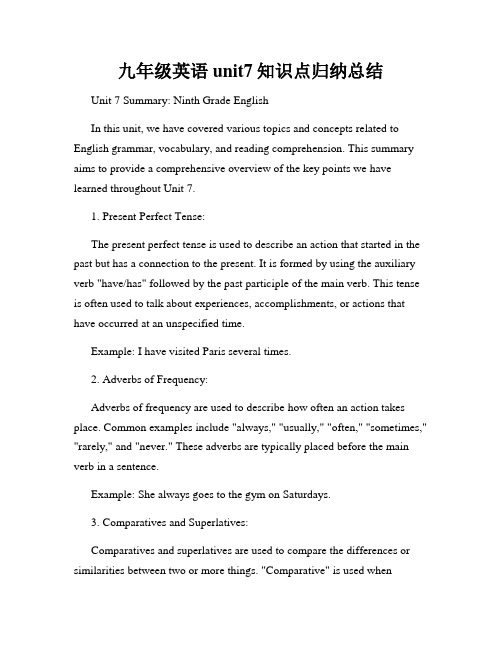
九年级英语unit7知识点归纳总结Unit 7 Summary: Ninth Grade EnglishIn this unit, we have covered various topics and concepts related to English grammar, vocabulary, and reading comprehension. This summary aims to provide a comprehensive overview of the key points we have learned throughout Unit 7.1. Present Perfect Tense:The present perfect tense is used to describe an action that started in the past but has a connection to the present. It is formed by using the auxiliary verb "have/has" followed by the past participle of the main verb. This tense is often used to talk about experiences, accomplishments, or actions that have occurred at an unspecified time.Example: I have visited Paris several times.2. Adverbs of Frequency:Adverbs of frequency are used to describe how often an action takes place. Common examples include "always," "usually," "often," "sometimes," "rarely," and "never." These adverbs are typically placed before the main verb in a sentence.Example: She always goes to the gym on Saturdays.3. Comparatives and Superlatives:Comparatives and superlatives are used to compare the differences or similarities between two or more things. "Comparative" is used whencomparing two items, while "superlative" is used when comparing more than two items. Adjectives and adverbs follow specific patterns when forming comparatives and superlatives.Example: He is taller than his brother. (Comparative)She is the tallest girl in the class. (Superlative)4. Modal Verbs:Modal verbs are used to express ability, necessity, possibility, permission, and other related concepts. Some common modal verbs include "can," "could," "may," "might," "must," "shall," "should," "will," and "would." These verbs are followed by the base form of the main verb, without "to."Example: You must finish your homework before going out.5. Reading Comprehension:Throughout this unit, we have practiced reading comprehension skills by analyzing various texts, such as articles, short stories, and poems. We have learned how to identify main ideas, infer meanings, make predictions, and summarize texts effectively. It is crucial to pay attention to context clues and other textual features to enhance comprehension.6. Vocabulary Expansion:In Unit 7, we have expanded our vocabulary by learning new words and phrases related to different themes, including education, technology, and leisure activities. Building a strong vocabulary is essential for improving overall language proficiency and communication skills.Remember, regular practice is key to mastering these concepts. Make sure to review and reinforce your understanding by completing exercises, engaging in discussions, and seeking further resources. By doing so, you will continue to enhance your English language skills and excel in your studies.In conclusion, Unit 7 has provided us with a comprehensive understanding of several crucial English language concepts. From grammar rules to reading comprehension skills and vocabulary expansion, these knowledge points will undoubtedly contribute to our overall language proficiency and academic success in English. Keep up the good work and continue to strive for excellence!。
九年级英语7单元知识点归纳总结
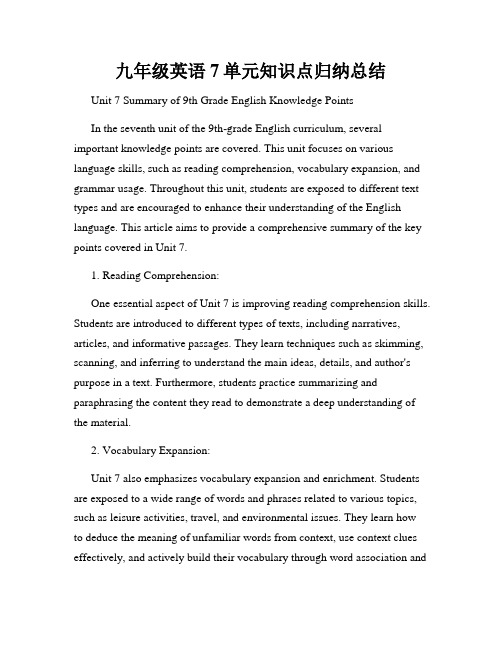
九年级英语7单元知识点归纳总结Unit 7 Summary of 9th Grade English Knowledge PointsIn the seventh unit of the 9th-grade English curriculum, several important knowledge points are covered. This unit focuses on various language skills, such as reading comprehension, vocabulary expansion, and grammar usage. Throughout this unit, students are exposed to different text types and are encouraged to enhance their understanding of the English language. This article aims to provide a comprehensive summary of the key points covered in Unit 7.1. Reading Comprehension:One essential aspect of Unit 7 is improving reading comprehension skills. Students are introduced to different types of texts, including narratives, articles, and informative passages. They learn techniques such as skimming, scanning, and inferring to understand the main ideas, details, and author's purpose in a text. Furthermore, students practice summarizing and paraphrasing the content they read to demonstrate a deep understanding of the material.2. Vocabulary Expansion:Unit 7 also emphasizes vocabulary expansion and enrichment. Students are exposed to a wide range of words and phrases related to various topics, such as leisure activities, travel, and environmental issues. They learn howto deduce the meaning of unfamiliar words from context, use context clues effectively, and actively build their vocabulary through word association andusage in context. Additionally, students practice using synonyms, antonyms, and idiomatic expressions to further enhance their language skills.3. Grammar Usage:Grammar plays a crucial role in Unit 7, wherein students review and learn new grammar structures. They reinforce their understanding of tenses, especially the present continuous and past continuous tenses, which are commonly used in narratives and descriptions. Additionally, students are introduced to reported speech and practice transforming direct speeches into reported speeches. They also explore more complex sentence structures, such as conditionals, passive voice, and relative clauses, to improve their overall language proficiency.4. Writing Skills:Unit 7 provides opportunities for students to practice their writing skills through various activities. They are encouraged to write descriptive paragraphs, narratives, and informal letters using the knowledge gained throughout the unit. Students focus on organizing their ideas coherently, using appropriate vocabulary and grammar structures, and effectively expressing themselves in writing. They learn how to plan and structure their writing, incorporate descriptive language, and edit their work for clarity and accuracy.5. Speaking and Listening:Unit 7 emphasizes speaking and listening skills through discussions, presentations, and audio materials. Students engage in conversations, express their opinions, ask and answer questions, and practice givingpresentations on various topics. They also listen to authentic audio recordings, such as interviews, speeches, and dialogues, to improve their listening comprehension and develop their ability to understand different accents and speech patterns.In conclusion, Unit 7 of the 9th-grade English curriculum covers a broad range of language skills, including reading comprehension, vocabulary expansion, grammar usage, writing skills, and speaking and listening proficiency. By focusing on these key points, students can enhance their overall language abilities and develop a solid foundation for future language learning.。
九年级英语知识点第七单元

九年级英语知识点第七单元随着学业的逐渐深入,九年级的英语学习变得更加重要。
第七单元是一个关键的阶段,涵盖了许多重要的知识点。
在这篇文章中,我们将探讨这些知识点,以便更好地理解和掌握它们。
首先,我们来讨论第七单元中的语法知识。
在这个单元中,我们学习了不少动词的时态和语态。
我们需要了解一些重要概念,如一般现在时、一般过去时和一般将来时。
此外,我们还学习了被动语态和情态动词的用法。
这些都是构建英语句子的重要组成部分,掌握它们将帮助我们更好地表达自己。
第七单元还包括了一些重要的词汇和短语。
我们需要学习一些常用的学术词汇,如理解、阐述和推理。
同时,我们还要掌握一些日常用语,如问候、感谢和道歉。
这些词汇和短语是我们在交流中经常使用的,对于提高我们的口语表达能力至关重要。
在阅读方面,第七单元主要关注理解和分析文本的能力。
我们将接触一些包含有关于社会问题和文化差异的文章。
通过阅读和分析这些文章,我们可以更好地理解不同的观点和见解。
同时,我们也将学习如何从文章中提取信息和做出合理推论。
这些阅读技巧将有助于提高我们的阅读理解能力并培养批判性思维。
第七单元中还包括听力和口语的训练。
我们将进行一些听力练习,以增强我们的听力理解能力。
在口语方面,我们将介绍一些重要的口语技巧,如与他人进行适当的交谈和讨论。
这将有助于提高我们的口语表达能力和自信心。
此外,第七单元还将引导我们使用英语进行写作。
我们将学习如何撰写一封正式的书信或电子邮件。
这对于我们以后的学术和职业发展将非常重要。
通过写作,我们可以提高我们的语言表达能力,培养逻辑思维和组织能力。
总的来说,九年级英语知识点第七单元涵盖了语法、词汇、阅读、听力、口语和写作等各个方面。
我们需要全面掌握这些知识点,并在日常学习中加以运用和巩固。
随着学业的逐渐深入,我们的英语水平也将不断提高,为我们未来的学术和职业发展打下坚实的基础。
希望这篇文章对于大家在第七单元的学习中有所帮助,祝大家取得优异的成绩!。
九年级七单元英语知识点
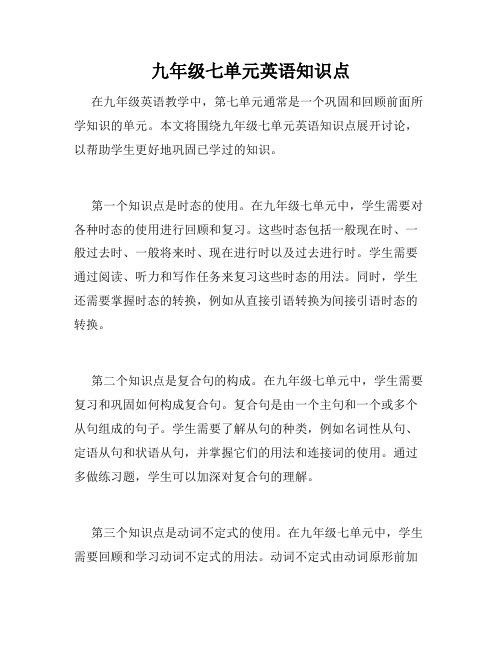
九年级七单元英语知识点在九年级英语教学中,第七单元通常是一个巩固和回顾前面所学知识的单元。
本文将围绕九年级七单元英语知识点展开讨论,以帮助学生更好地巩固已学过的知识。
第一个知识点是时态的使用。
在九年级七单元中,学生需要对各种时态的使用进行回顾和复习。
这些时态包括一般现在时、一般过去时、一般将来时、现在进行时以及过去进行时。
学生需要通过阅读、听力和写作任务来复习这些时态的用法。
同时,学生还需要掌握时态的转换,例如从直接引语转换为间接引语时态的转换。
第二个知识点是复合句的构成。
在九年级七单元中,学生需要复习和巩固如何构成复合句。
复合句是由一个主句和一个或多个从句组成的句子。
学生需要了解从句的种类,例如名词性从句、定语从句和状语从句,并掌握它们的用法和连接词的使用。
通过多做练习题,学生可以加深对复合句的理解。
第三个知识点是动词不定式的使用。
在九年级七单元中,学生需要回顾和学习动词不定式的用法。
动词不定式由动词原形前加上“to”构成,用来表达目的、愿望、建议等。
学生需要学习动词不定式的位置和用法,并能够在实际语境中正确运用。
第四个知识点是情态动词的使用。
在九年级七单元中,学生需要掌握情态动词的用法和意义。
情态动词包括can、could、may、might、shall、should、will、would、must等。
学生需要学习情态动词的能力、可能性、许可和义务等用法,并能够用适当的情态动词来表达自己的意思。
第五个知识点是定语从句的使用。
在九年级七单元中,学生需要回顾和巩固定语从句的用法。
定语从句用来修饰前面的名词或代词,并对其进行限定或补充说明。
学生需要了解定语从句的引导词和位置,并能够在实际语境中正确运用。
第六个知识点是状语从句的使用。
在九年级七单元中,学生需要学习和掌握状语从句的用法。
状语从句用来修饰主句中的动词、形容词或副词,表示时间、地点、原因、条件、方式等。
学生需要了解状语从句的引导词和位置,并能够在实际语境中正确运用。
新版新目标英语九年级unit7知识点总结(K12教育文档)

新版新目标英语九年级unit7知识点总结(word版可编辑修改)编辑整理:尊敬的读者朋友们:这里是精品文档编辑中心,本文档内容是由我和我的同事精心编辑整理后发布的,发布之前我们对文中内容进行仔细校对,但是难免会有疏漏的地方,但是任然希望(新版新目标英语九年级unit7知识点总结(word版可编辑修改))的内容能够给您的工作和学习带来便利。
同时也真诚的希望收到您的建议和反馈,这将是我们进步的源泉,前进的动力。
本文可编辑可修改,如果觉得对您有帮助请收藏以便随时查阅,最后祝您生活愉快业绩进步,以下为新版新目标英语九年级unit7知识点总结(word版可编辑修改)的全部内容。
Unit 7 Teenagers should be allowed to choose their own clothes. Section A1.sixteen—year—olds= sixteen-year—old children 十六七岁的青少年an eight—year-old girl 一个8岁的女孩2.choose—chose—chosen v选择 choice n。
选择choose one's own clothes 选择某人自己的衣服 choose to do sth 选择做某事make a choice 做选择 make one's own choice 做某人自己的选择have no choice but to do sth 只好做某事,除做某事之外,别无选择3. allow v 允许allow sb to do sth 允许某人做某事 allow doing sth允许做某事be allowed to do sth被允许做某事be not allowed to do sth 不被允许做某事should be allowed to do sth 应该被允许做某事should not be allowed to do sth 应该不被允许做某事4. drive v。
九年级英语第7单元知识点
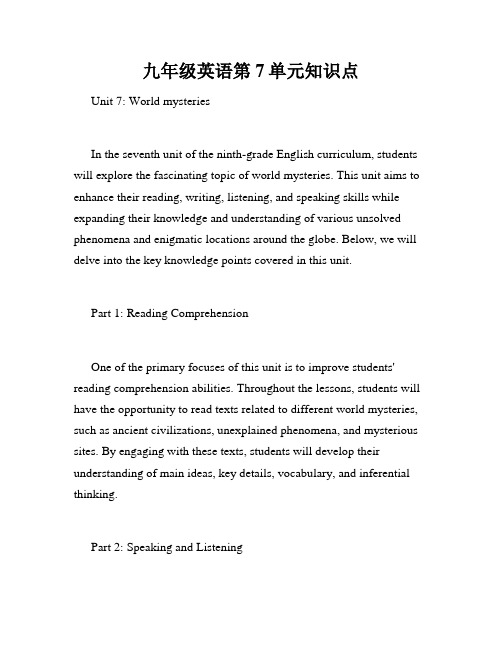
九年级英语第7单元知识点Unit 7: World mysteriesIn the seventh unit of the ninth-grade English curriculum, students will explore the fascinating topic of world mysteries. This unit aims to enhance their reading, writing, listening, and speaking skills while expanding their knowledge and understanding of various unsolved phenomena and enigmatic locations around the globe. Below, we will delve into the key knowledge points covered in this unit.Part 1: Reading ComprehensionOne of the primary focuses of this unit is to improve students' reading comprehension abilities. Throughout the lessons, students will have the opportunity to read texts related to different world mysteries, such as ancient civilizations, unexplained phenomena, and mysterious sites. By engaging with these texts, students will develop their understanding of main ideas, key details, vocabulary, and inferential thinking.Part 2: Speaking and ListeningAnother important aspect of this unit involves honing students' speaking and listening skills. Students will participate in discussions and group activities that require them to communicate their thoughts, opinions, and interpretations of the world mysteries discussed. By expressing themselves verbally and actively listening to their peers, students will strengthen their speaking and listening proficiency.Part 3: Writing SkillsThe unit also provides opportunities for students to enhance their writing skills. They will engage in various writing tasks, including descriptive and persuasive writing, as well as summarizing and analyzing information from the texts they have read. By practicing these different types of writing, students will improve their ability to convey ideas effectively and succinctly.Part 4: Vocabulary ExpansionBuilding vocabulary is a crucial component of language learning. In this unit, students will encounter a wide range of new words and phrases related to world mysteries. By learning this vocabulary, students will improve their ability to comprehend texts, express themselves accurately, and engage in meaningful discussions.Part 5: Grammar UsageThe seventh unit also aims to reinforce students' understanding and usage of grammar. Students will review and practice various grammatical structures within the context of the texts they read and the writing they produce. This will help them develop more precise and grammatically correct English language skills.Part 6: Cultural AwarenessAdditionally, the unit incorporates cultural aspects into the lessons. Students will explore different cultural beliefs, traditions, and legends associated with world mysteries from various countries and regions. This exposure to different cultures will broaden their perspectives and foster cultural awareness and understanding.Overall, the seventh unit of the ninth-grade English curriculum offers students the opportunity to delve into the captivating realm of world mysteries. By engaging with texts, participating in discussions, and developing their writing skills, vocabulary, and grammar usage, students will not only improve their English language proficiency but also expand their knowledge of the world around them.。
